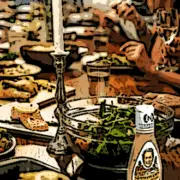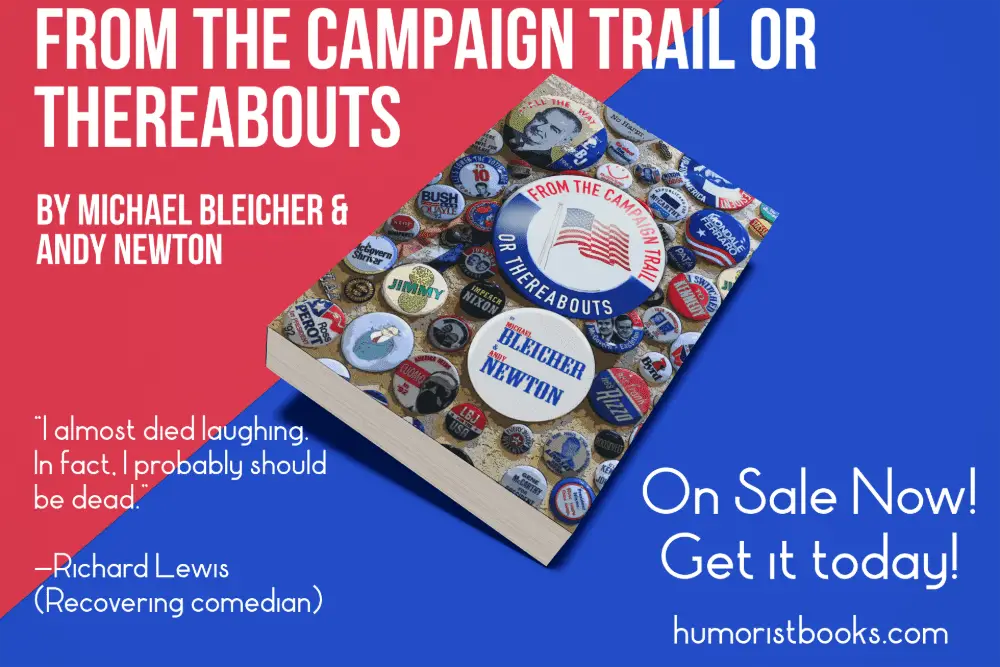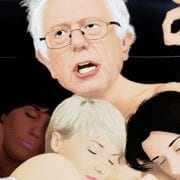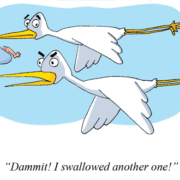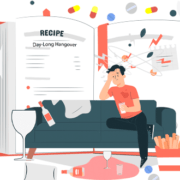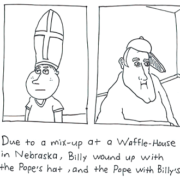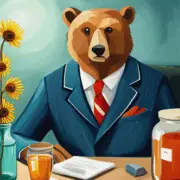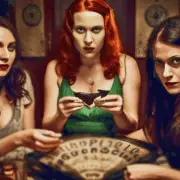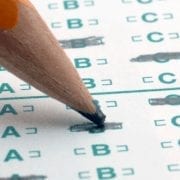EXCLUSIVE BOOK EXCERPT: ‘From the Campaign Trail or Thereabouts’ ~ Buy It Today!
“You Mean the American Election?”
January 5, 2016
“Is this quail?” Harold asked in a whisper, leaning in close to examine the contents of the chafing dish in front of him.
Pattie glanced over at the tray. “Cornish game hen.” She spooned some fingerling potatoes onto her plate.
“I thought they were hiring waiter service for the evening. They could have at least served quail.” Harold prodded at his dish. “Or lobster tail.”
Pattie looked around the room as she waited for Harold to dress his salad. “The Apfelbaums went all out for Natalie’s fortieth.”
“Forty,” Harold groaned. Thin and neither tall nor short, he had crow’s feet forming around his eyes, slightly thinning blond hair, and an easy indifference to his surroundings. “Only three more years. I always figured I’d own a brownstone by the time I was forty.”
“That was my hope, too.” Pattie fidgeted impatiently. “Come on Harold, you’re not frosting a cake. Just ladle it on and go.”
“Pattie, I think this is Paul Newman dressing!” Harold hissed contemptuously. He twirled the dressing with the ladle. “We could buy this!” Pattie gently took the handle out of his hands and dripped a judicious amount of vinaigrette onto her field greens. The pair took their seats around an oblong mahogany table lined with a finely-woven red cloth. Slightly worn pewter candlesticks with the letters “MA” embossed at the base sat on either side of a small glass bowl filled with tangerines and pine cones.
“Natalie, I love these candlesticks,” Pattie said cheerily, leaning down the table. Apple-cheeked with wavy black hair, she had a wry smile and probing, dark brown eyes.
“Oh, thank you!” Natalie, who was dressed in a tight-fitting ensemble of black pants, blouse, and sweater, replied. “Those are my grandmother’s. She brought them with her out of Germany in 1933.”
“Pattie, your grandmother didn’t happen to bring in anything like that, did she?” Harold asked through a mouthful of game hen. “We could have it appraised.”
“Ignore him,” Pattie said, attempting a laugh.
“Oh, speaking of, did anyone happen to read that article in The New Yorker last week on antique forgeries?” a slim man with an Aquiline nose and a crop of carefully unkempt hair asked, looking up from a wine label he was examining.
“No, I didn’t, but Pattie! You must be so proud!” Natalie exclaimed from the head of the table.
Pattie blushed. “I didn’t even know I was up for—”
“Oh, don’t be modest, Pattie,” Harold said, washing down his food with a sip of wine. “For crying out loud, you just won a Peabody!”
“Pulitzer.” Pattie rolled her eyes and attempted a look of comic exasperation.
“Right, right, a Pulitzer.” Harold dabbed his mouth with his napkin. “They are such engaging little blurbs she writes, the television summaries.” He prodded the hen. Natalie coughed uncomfortably.
“Well, it was an exploration of Julia Louis-Dreyfus, the cult of celebrity, and second acts in American life, but yes, I certainly had no idea it would be this big.”
“And how’s your work going, Harold?” the slim man asked. “Are you still covering the metro desk?”
“Harold’s covering the entire tri-state area now,” Pattie interjected before Harold could swallow his mouthful of bread. “If you have a tip about a sewage crisis in New Jersey, you can tell him directly, these days.”
“Actually, Harold, if you wouldn’t mind, I’d love to pick your brain about that,” said a short, rotund older woman sitting across the table. She wore a purple pantsuit and a hat topped with a large arrangement of flowers. A small pair of square, transition-lens glasses were perched halfway down her nose. “When I first ran for the New York State Assembly, I championed a platform to revamp the sewer systems of our towns upstate,” she added proudly. “‘Drain the Septic Tanks!’ was our slogan,” she chuckled.
“Oh, sure, perhaps later this week?” Harold asked brightly, sensing the spotlight. “I’m off the clock now.”
“That was the McCornish Bill, right?” Pattie asked.
The woman’s face dropped. “Well, that was a piece of very compromised legislation that was ultimately adopted after popular pressure forced them to do something.”
“This hen is dry,” Harold whispered to his wife. “Really, how much are lobster tails for eight? If I were heir to a toothpaste fortune—” Pattie nudged him under the table.
“While we’re eating, can we perhaps change the subject from such matters as sewage or New Jersey?” an implausibly young-looking man with impassive hazel eyes, stubble, and a prematurely bald head interjected. “I don’t know if any of you saw the 36 Hours on the Cyclades. Anthony, did you?” he asked, nodding his head in the direction of the slim man. “You and Natalie were there two years ago, right? I couldn’t believe they omitted Paros in favor of Mykonos. It’s like, am I reading Frommer’s?” The table laughed.
“Oh, Greece,” Natalie said wistfully, looking over at her husband. “Can we go back?”
“When would you like to go?” Anthony asked.
“Yesterday,” Natalie replied with a smile. “The Elounda Beach Hotel was heaven on Earth.”
“Did they go back to the drachma?” Harold interjected. “I have to imagine, since the economic crisis there, it must be a tourist’s paradise.”
“Still on the Euro, actually,” Anthony replied without making eye-contact.
“If you go back, you need to charter a craft,” the rotund woman declared. “After my city council run, I spent three months sailing the wine-dark seas. It was such a healing voyage.”
“Do you think they’d still take my drachmas if I brought them to one of those exchange kiosks at the airport?” Harold asked, leaning over the table to address Anthony. “I still have about fifty dollars worth saved from when my parents took me the summer after college, is the thing.” Anthony looked at him blankly. Natalie pretended to laugh, then stopped quickly, realizing that no joke had been made. Harold coughed, his face reddening slightly. “That was really quite the trip,” he stammered. “Of course, I guess we all remember our first time abroad. The sights, the smells. Everything was so cheap there, I sure remember that.” He gave a forced laugh. “Not that it mattered,” he added quickly.
Natalie turned to Pattie. “Pattie, when was the last time you were there?”
“Oh, yeah. Let me think,” Pattie gazed thoughtfully across the table into a watercolor portrait of an African woman wearing a tribal headdress. “I didn’t get that far on the Switzerland trip, or the…jeez,” she smiled. “I guess I haven’t been since I was in eighth grade. That was the first time I’d been anywhere further than Paris.”
“Natalie, this is great,” Harold interrupted. “Is this quail?”
“I went with my best friend—Natalie, you’ll love this. Your lab partner from seventh grade chemistry, Shirley Burden, and her step-father, Mr. Rose—well, we call him Charlie now.”
“Shirley!” Natalie exclaimed. “I forgot how close you two were in middle school. What was that like?”
Pattie shrugged. “It was right after the marriage, so they let each of them bring along a friend so it wouldn’t be so awkward for Amanda to be there with him and the kids.”
“Well, dear, this can be the second time someone’s paid your way to Athens,” Harold interrupted again. He turned to the rest of the table. “We’re headed to Greece this summer, all on my editor’s dime,” he added.
“Uh-huh?” Anthony asked disinterestedly.
“A little-known trick of the newspaper trade,” Harold said proudly, taking a tangerine out of the centerpiece bowl. “I just have to get myself assigned to cover something there, like the debt crisis, or afternoon naps, and there’s two weeks in Greece, bought and paid for. And of course, as long as I’m there, who’s going to notice an extra order of moussaka on the expense reports back in New York?” He winked at Pattie.
“Well, we didn’t discuss paying for it that way,” Pattie laughed tensely. “It’s for our tenth anniversary. We’re still in the planning stages, but I always think that’s half of the fun.”
“Of course,” Anthony agreed. “You really should wait until the early fall to go. You’ve read The Colossus of Maroussi, I presume? Miller describes September in Greece with such poetic accuracy. You should read it now, if you haven’t already. You’ll be transported.” Pattie nodded thoughtfully, smiling. She glanced over at Harold, who had placed the tangerine rind next to his plate and was dipping a corner of his napkin into his water glass.
“Harold, have you ever thought about covering trials?” Natalie asked. “I think that would be fascinating. Peering inside the justice system. Actually, do you know who wrote that Times piece on the first Freddie Gray trial, the one that starts tomorrow.”
“Right,” Harold said, confused. “Freddie Gray.”
“Oh!” the rotund woman interrupted. “Wasn’t that horrible? That poor boy. His whole future ahead of him. I saw his picture in the newspaper. He looked like such a fine, thoughtful young man.”
“Yes, very thoughtful,” Harold agreed quickly, grabbing on to this nugget of information.
“Well, he had a series of drug charges and minor crimes,” Anthony corrected. “But of course, you have to account for the environment in which he grew up…”
“Right,” Natalie agreed. “If you adjust for how, if he had grown up in a normal environment, there would be no criminal record and no cloud over him.”
“That’s what I’ve always said. When I ran for the Queens Library Volunteer Coordinator position last fall, I pressed hard for more public programs. We need to get these children off the streets and back in schools!”
“Of course, you can understand the rioting,” the bald man explained, reinserting himself into the conversation. “Some protest, even unrest, is healthy. Much like how the body sweats when it’s suffering from a fever, it’s a way of cleansing, of breaking that societal infection.” He gently reached for the bottle of wine.
“I’m right there with you,” Anthony agreed. “But did they need to start looting? I mean, what political point are they making by smashing a window and running off with a plasma television?”
“And all the destruction,” Pattie added, disapprovingly. “They burned that CVS. I think it only hurts their cause when people see that violence.” Harold nodded vigorously.
“And that waste,” the bald man concurred. “It hurts them more than anyone else to set a CVS on fire. It hurts their protest, it hurts indigent people in their communities that shop at CVS, and it hurts the optics.”
“Right,” Natalie exclaimed. “I’m all for protesting police violence, but, you know, there’s a correct time and place for it. When they block traffic and shut down a city, don’t they sort of become the aggressors?”
“There’s a difference between activism and anger,” Anthony declared. “You want to have your people being the ones getting attacked. You don’t want them to be the ones looting and burning. You know who understood that, was Dr. Martin Luther King, Jr. He understood optics.” There was a chorus of “mms.”
“Of course, it is good, like you said, to see the community sticking up for itself,” Natalie began.
“Yes,” Pattie affirmed. “It’s really beautiful.” There was a pause as the table reflected.
“They have fantastic seafood in Baltimore, I recall,” Harold added. “Crab. Shrimp. Probably even lobster.” His right thigh began to vibrate. Harold reached into his pocket, retrieving his phone and glancing at the screen. “Jeez, I’m off the clock!” he moaned. “My editor,” he explained to the table.
“You can take it in the study, if you’d like,” Anthony offered.
“Oh, terrific. Probably just calling to see if I want to upgrade to business class for my flight to Athens.” Harold reached for a second tangerine as he stood up. Pattie slapped his hand away.
“They’re decorative, Harold,” she hissed.
He shrugged and put the phone to his ear as he exited the dining room. “Hello, sir? No, no, I’m working from home tonight. Sir, I promise you, that man is a magician. I’m just waiting for a source to—oh? Oh, a new assignment?” Harold walked down a short, dark hallway lined with black-and-white photographs, into a wood-paneled room filled with bookcases. Several imposing masks, evidently African in origin, hung high on the walls. His heart swelled with envious appreciation.
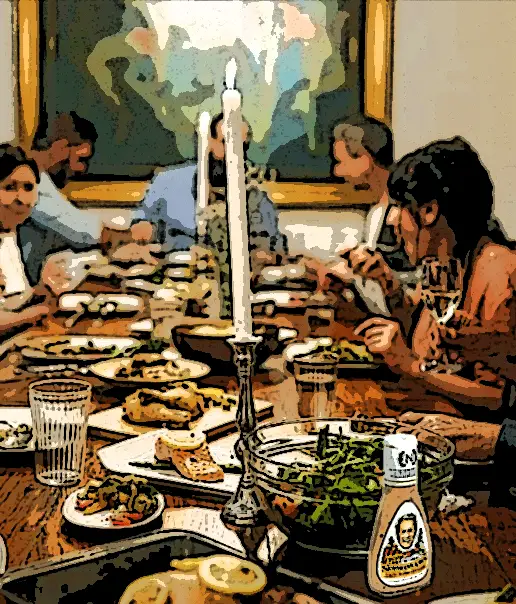
“Something different this time, sir? Not another D-Train masturbator, I hope. No, just, the last time you said that—oh? Covering the election? Well, if I catch the LIRR, I can probably be in the—how’s that, sir? You mean the American election?” Harold bumped into a bookcase jutting into the center of the room, knocking to the floor a small, phallic folk-art statuette. “No, sir, that was just the power adapter for my laptop. It fell to the floor, sir. Yes, hard at work, right. I’ll sleep when the news does.” Harold picked up the statuette and, noticing a fresh gash in the wood, gingerly placed it back on the shelf, rotating it around carefully.
“Sir? I thought that Joshua Martin was covering the Republican primaries. Didn’t you move him from his post in Moscow just for that purpose?” Harold listened intently. “Really? On tape? And his stories are different now? The last one was all about what a great dancer Putin is? What a shame, sir. And right after he landed the American election, too. No, no, absolutely. My gain, sir, one hundred percent.” Harold picked up a thick ballpoint pen off of the desk in the center of the room and examined it under the overhead lights for a moment before slipping it into his pants pocket. No one would notice a missing pen here, he concluded.
“You know, sir, it occurs to me that Martin’s termination probably affects your coverage of Europe in general. For example, who’s covering Greece now? Well, Europe is pretty small, sir. I assume Russia and Greece are practically the same beat. Anyway, Greece is in the midst of a massive debt crisis at the moment. I hear they may even go back on the drachma. Perhaps I could cover both the American election and the debt crisis. I’m sure there would be some coverage of our election on Greek TV. Sky News, sir. It’s on all over Europe. I’m sure they would be talking about the election on a regular basis. I could plan to be in the room, or in the hotel bar, maybe, if there’s a TV in the hotel bar, and sort of take notes when the election comes up on Sky News, and just send that right along to you.” Harold examined a large, antique stapler sitting atop two volumes of Winston Churchill’s A History of the English Speaking Peoples and made a mental note to obtain some rare books.
Pattie poked her head into the study. “Everything okay?” she whispered. “Natalie’s about to serve the tiramisu.”
Harold held his hand over the phone. “Ask her to wrap up my hen!” he mouthed. “I didn’t finish it.”
Pattie rolled her eyes and slipped back out of the room.
“Pattie! Throw a couple rolls in there, too!” Harold called after her. He took his hand off the phone. “Sorry, could you repeat that, sir? No, no, I just got distracted by an email. A confidential source just emailed me. Right, multitasking, like always. My first stop? Des Moines? Uh huh.” Harold twirled the rotary dial of a large black telephone mounted to the side of a bookcase. “Sir? It occurs to me that Des Moines is not especially close to Greece. Well, I hear that the Elounda Beach Resort has satellite TV in each room. They probably get Sky News there. Ah. So that’s a definite ‘no’ on the Sky News angle. Got it. No, Iowa sounds lovely, too. No, sure, if there’s going to be a primary there. Right, sir.”
Pattie returned with a small plate of tiramisu. “Natalie insisted that you not miss out,” she said quietly.
Harold placed the plate on the History of the English-Speaking Peoples. “I heard something about cappuccino?” he whispered. “Yes, sir,” he stammered, turning his attention back to his call. “So I assume I’ll follow the big players on the trail. Hillary. Mitt. Ted who? Ted Cruz. So the Democrats would have the first female nominee or the first Hispanic nominee. A Republican? Oh, right—that Ted Cruz. No, of course I’d heard of him, sir,” Harold said quickly. “Yeah, so those two. How’s that? Right, and sixteen other candidates. No, of course I know that, sir. Do you think I don’t read our paper? Every Sunday, like clockwork. Uh-huh, daily, sure.”
“The election?” Pattie mouthed.
“Yes, sir, the chance of a lifetime. So, I’ll be covering Ted and the sixteen other Republicans. And the Democrats are running just Hillary this year? Well, sir, I’ve been knee-deep in my beat, if you will. No, of course I know who Sanders is. Sir? Before you jump off, I was wondering if we could just play a quick game. No, a political one. I was thinking, maybe you could just rattle off the names of all of the candidates, and then I can see if you named them all. Hello? Hello?” Harold looked at his phone, pocketed it, and picked up the plate of tiramisu.
“What’s this about the election?” Pattie asked.
“Bad news, Pattie,” Harold said woefully through a mouthful of mascarpone. “It seems that our grand plans for Greece are out.”
“What? Why?”
“Well, apparently, there’s a video of some Russian honeypot pooping on the chest of one of our reporters, which has created some objectivity problems, and now I have to cover the presidential election in his stead.”
“What? Harold!” Pattie exclaimed. “That’s incredible!” She looked at him with fresh admiration. “See, I told you, if you just started checking your email once over the weekend.”
“Well, yeah.” Harold pursed his lips. “But it puts the kibosh on our Greece plans, since I’ll be more or less on the road from now until November.”
Pattie paused, considering before she spoke. “That’s probably just as well for us, right?”
“Just as well?”
“Come on,” Pattie smirked. “Two weeks of time alone together to reconnect? Talk about treating the symptom, not the cause. What do we even pay Dr. Rothstein for?”
“Pattie,” Harold said sternly. “We had this conversation when you threw away your sock puppet.”
“Harold, you can’t even get through a single session without using Gary the Goat as a buffer. How were we ever going to survive two weeks alone together in a foreign country?”
“That’s why this will be so much better than Greece! There won’t be so much pressure, relying on each other to figure out what signs are for the bathroom. Just you, me, and the great American wilderness. Like Lewis and Clark but in a rental convertible.”
“How’s that, then?”
“We can expense the convertible.”
“No, the part about about me.”
“Well, you’ll come with me.”
Pattie laughed. “What about my job? The charity boards I’m on? Film Forum is about to have a retrospective on Fellini!”
“Pattie, this is what Dr. Rothstein was getting at when he gave us the dream journals and the olives. You need to feed all of you.”
“Harold, I can’t babysit you while you take a tour of America’s lesser-known pig farms. This isn’t like that assignment your editor sent you on out in Montauk. This is the election. I just can’t leave for that long.”
Harold sighed impatiently. “But that’s the same excuse you gave when I wanted to go to Niagara Falls last month. You can write your little blurbs anywhere. At some point, it’s now or never.” Harold gave the stately desk a determined tap. “A great American road trip could be just the B-12 shot our marriage needs. New Orleans, Nashville, Chicago, San Francisco—and what about this? San Diego?”
Pattie perked up. “San Diego?”
“Oh, Pattie, you’d love San Diego. It’s everything Greece is and more. It’s warm. It’s sunny. Waiters have to wash their hands before leaving the restroom.”
Pattie thought. “I have always wanted to see San Diego.”
“Oh, I hear it’s lovely. I hear there are seals that come right up onto the beach. Seals! And we won’t have to pay for any of it.”
“Sure,” Pattie said. “I’ve heard that before. Who ended up having to drive back to the South Huntington Pottery Barn with a personal check?”
“No, this is different. I have to go anyway. Who’s going to know if you’re staying in my hotel room? Who’s going to notice a few extra entrees when I submit my meal receipts? Do you have any idea how many receipts that paper gets in one day? Nobody’s going to notice an extra Cobb salad. That’s practically the motto of the journalism industry, Pattie.”
“I don’t know. When do we leave for San Diego?”
“Well, first we have to stop at Des Moines, but I assume we can find our way to San Diego pretty early on.”
“Isn’t California’s primary in June?
“Is it? See, this is why I need you with me.” He placed his hands on Pattie’s shoulders. “Anyway, once I get on the road, I’ll have plenty of latitude to make my own decisions. You don’t work your way up through the sewage industry without getting a little discretion to follow a story wherever it leads, honey.”
Pattie hesitated. “I don’t know.”
“Pattie, remember when you shared the entry in your dream journal about the dairy farm? Remember the promise?”
“Okay, okay,” Pattie sighed, gently removing Harold’s hands from her shoulders. “I bet San Diego would be nice in the spring.”
“You’ll be sunning yourself and sipping margaritas before you can even say ‘trial separation.’”
* * *
- About the Author
- Latest Posts
Michael Bleicher and Andy Newton are above-average in height and know the harmony parts to most Simon & Garfunkel songs. Andy is an editor in New York City and Michael is a copyright attorney in Washington, D.C.

